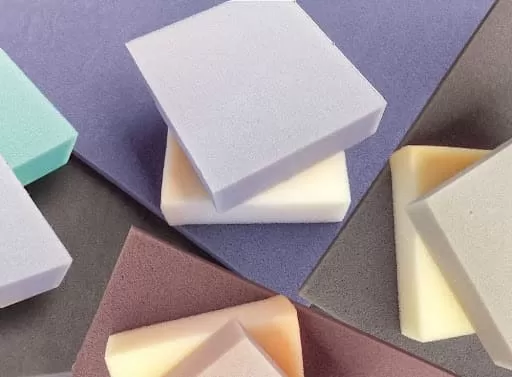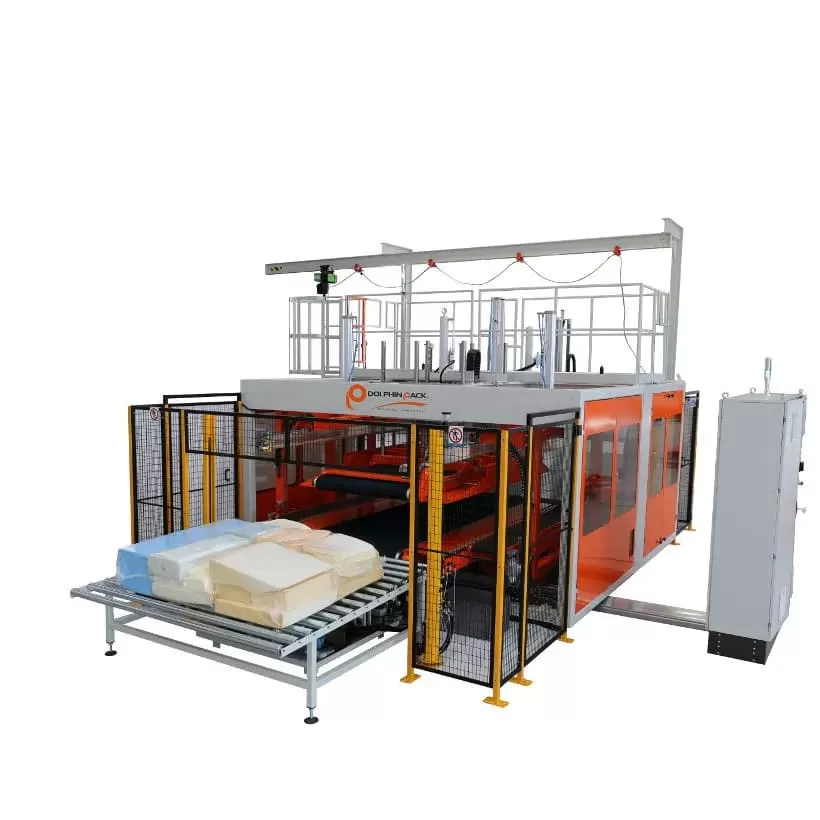Properties, types and uses of polyurethane
Polyurethane: an essential material for many sectors and applications
Polyurethane is an extremely versatile material produced on a large scale by specialized companies to meet the needs of numerous industrial sectors. Thanks to its various formulations, it can be found in the form of flexible, rigid or thermoplastic foam, and is used in the construction, automotive, furniture, footwear and other sectors. In this article, we will analyze its origin, main characteristics, different types and applications, focusing on the importance of efficient packaging to ensure its quality and durability.
Polyurethane: What it is and how it became popular
Polyurethane (PU) is a polymer derived from the reaction between an isocyanate and a polyol. Its invention dates back to 1937, when German chemist Otto Bayer developed this new material with the goal of creating a more versatile and durable alternative to natural rubber. After its discovery, polyurethane spread rapidly because of its ability to adapt to various industrial needs. During World War II, it was used primarily as insulation for aircraft and submarines due to its excellent thermal and mechanical properties. Initially, it was used to make coatings, adhesives and insulation materials, but over time, its versatility made it increasingly popular in industries such as automotive, construction and furniture.

In later years, as polymer chemistry advanced, polyurethane was further improved and adapted to new applications. Today, it is one of the most widely used materials in the world, with applications ranging from manufacturing to everyday consumer products. Its formulation can vary according to industrial and geographical needs, adapting to specific regulations and different climatic conditions.
General properties of polyurethane
Due to its chemical composition, polyurethane has developed a number of properties that make it suitable for a wide range of applications. Regardless of the specific type, the material has certain universal characteristics that determine its versatility and performance. These include:
- High mechanical strength: polyurethane is known for its ability to resist mechanical stress, impact and deformation.
- Good thermal and acoustic insulation: due to its cellular structure, polyurethane offers excellent insulation properties, helping to improve the energy efficiency of buildings and industrial systems.
- Waterproofing and chemical resistance: the material is highly resistant to water, oils and many chemicals, making it ideal for applications in harsh environments.
- Modular flexibility and rigidity: depending on the formulation, polyurethane can be rigid, flexible or expanded, adapting to a wide range of applications.
- Durability: this material is known for its longevity and ability to retain its structural properties after years of use.
Variations in polyurethane composition around the world
The composition of polyurethane varies according to local regulations, raw material availability and climatic conditions to meet the needs of each market. Different regulations affect the use of certain chemicals, which affects the final properties of the material and its applications.
Climate also plays an important role. In cold countries, formulations with high thermal resistance are preferred to improve building insulation, while in tropical regions, additives are added to combat moisture. Where temperature ranges are high, dimensional stability is essential to prevent warping.
Different industries also influence the composition of polyurethane. In construction, advanced markets are developing high-performance insulation materials, while other markets are focusing on cheaper solutions. In the automotive sector, polyurethane must combine heat resistance in hot climates with comfort in colder countries.
Thanks to this adaptability, polyurethane is constantly evolving to provide tailor-made solutions for every market and application.
Polyurethane types and applications
Depending on its composition and specific properties, polyurethane can take on different characteristics that determine its use in different industries. The material is divided into different categories based on its structure and use. The main types include:
Polyurethane foam
Polyurethane foam is one of the most popular materials due to its versatility and properties that make it ideal for many applications. It is characterized by an open or closed cell structure, which gives it great elasticity, shock-absorbing capacity and excellent insulating properties. This makes it ideal for the production of polyurethane foam mattresses, pillows, upholstery and sound absorbing materials, providing comfort and protection in both domestic and industrial environments. In addition, due to its low thermal conductivity, it is also used as a thermal insulator, helping to improve energy efficiency in various fields.
Flexible polyurethane
Flexible polyurethane foam is a more elastic and malleable version of the material, with a remarkable ability to deform without compromising its structure. It is widely used in the manufacture of automotive seats, furniture upholstery and mattresses because of its balance of comfort, durability and wear resistance.
Rigid Polyurethane
Rigid polyurethane is characterized by its high density and compressive strength, properties that make it particularly suitable for structural applications. It is widely used in the construction industry for insulation panels, cold storage rooms and aerospace structures.
Other types of polyurethane
In addition to the main types, there are other types of polyurethane developed for specific applications:
- Thermoplastic polyurethane (TPU): a highly elastic and abrasion-resistant material used for shoe soles, electronic device housings and industrial seals.
- Integral polyurethane: a combination of expanded and rigid polyurethane, used for steering wheels, armrests and ergonomic components.
- High resilience (HR) foam: an enhanced version of flexible polyurethane, used in automotive seats and high-performance mattresses to provide superior comfort and durability.
Polyurethane packaging: protection and efficiency
Polyurethane packaging is an essential step in protecting and preserving materials during transportation and storage. Because polyurethane can come in a variety of forms, such as foam or rigid panels, packaging requirements vary widely. Proper packaging is essential to preserve its properties and prevent damage or exposure to moisture and external agents that could compromise its quality and durability.
Dolphin Pack meets these needs with specific solutions for each type of polyurethane, ensuring safe, efficient and optimized packaging for the industrial sector. Dolphin Pack's modern packaging solutions include automated systems capable of adapting to different types of polyurethane, ensuring safe and efficient packaging. The complete lines offered by the company are designed to accurately and reliably handle materials of different sizes and consistencies, optimizing space, reducing waste and improving logistical and production efficiency.
For polyurethane that does not require compression, Dolphin Pack offers the Mistral 3B MCL packaging line, designed to safely package products of different sizes without compromising their structure. This technology ensures strong and compact packaging, ideal for insulation boards, blocks, polyurethane panels and industrial components that do not require compression but need stability and protection during handling.


For flexible polyurethane foam, Dolphin Pack offers advanced solutions that take advantage of the material's ability to be compressed without damage. Among these is the Burian polyurethane packaging machine, which combines the compactness of rolling with the advantages of flat packaging. This system makes it possible to reduce the volume of products, optimize space, reduce transportation costs and improve logistics, all without compromising the characteristics of the material.
Relying on Dolphin Pack means choosing a partner who can offer customized solutions for all your polyurethane packaging needs. Do you want to know which solution is best for your company? Contact us for a personalized consultation!




